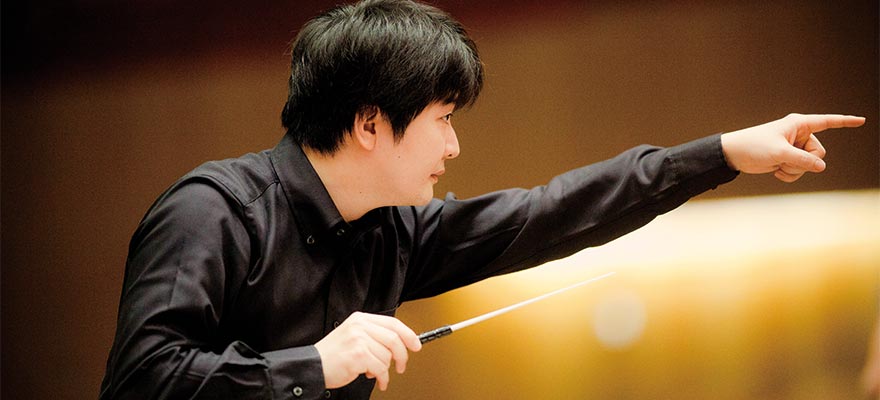Home > Highlighting JAPAN >Highlighting Japan February 2014> Japanese Abroad
Highlighting JAPAN
Japanese Abroad
The changing shape of music
Kazuki Yamada

Music is a language, with its alphabet in notation, its grammar in rhythm and the scales, and its slang in the interpretation of the player. It's spoken in dialects from rock and pop to classical, jazz, blues and hip-hop. Every time a multifaceted array of instruments plays in concert, we can appreciate the incredible work that goes into bringing such unique and disparate elements together to speak in a single voice of harmony.
As principal guest conductor of Orchestre de la Suisse Romande in Geneva, Switzerland, Kazuki Yamada naturally knows all of this. He secured the position after a sensational 2010 debut, one of his first appearances in Europe. He is also the principal conductor of the Japan Philharmonic Orchestra and conductor in residence for the Tokyo Philharmonic Chorus. In addition to the impressive list of prizes he has won and soloists with whom he has worked, Yamada has appeared with orchestras in France, Germany, Russia, Austria, the Czech Republic and the U.K., among others.
Born in Kanagawa Prefecture in 1979, Yamada began playing the piano at an early age. After a few dissatisfying experiments with the trumpet, percussion, the viola and the clarinet, he returned to the piano and entered Tokyo University of the Arts, where he graduated from the conducting course in 2001. While there, he formed the Yokohama Sinfonietta, conducting all nine of Beethoven's symphonies at the age of 22. Now a husband and father, he lives in Berlin but frequently travels to Geneva, Monte Carlo and Japan.
How does he keep up? "I often wake up and don't know precisely where I am or which day it is," Yamada says.
The hardest part of moving around so much, he says, is getting to know his players. "Almost every orchestra I play with is new, and I need to have all of the players united with my vision to follow my lead. The most stressful time is always before the first rehearsal. After that, we get to know each other and things get better, but it's not easy."
Yamada's conducting style has a defined character, relying not on aggressive or flourished movements, but on fluidity and a sense of grace. "I try to find a specific interpretation, the drama in the composition. I think musical pieces have stories to tell, and my effort is always directed toward getting this story out. I like lyrical music — cantabile — so this is what I try to aim for." He says his dream is to become an opera conductor.
Having achieved so much so early in life, Yamada is conscious of the challenges that lie ahead. "When you begin as a winner, everyone always expects some-thing better. There's a lot of pressure. Just being good isn't enough anymore."
How does he get by working with people of so many varied nationalities? "I usually speak to everyone in English," he says, "but my language skills are poor. And in Germany I use German, while in Geneva I need to use French." And of course, most music scores are in Italian. But the key isn't language – it's the enthusiasm for communication.
Yamada doesn't seem to think his multinational career is as fast-paced as life in Japan, however: "Living in Japan is different from being abroad," he says. "Japan is a very busy country, so there are many shops open all night and quite a few comforts available 24/7. Abroad, there may not be convenience stores, but life is conducted at a more leisurely pace."
With his talent for communication and passion for the art, Yamada will surely be regaling us with many more musical stories for years to come.
© 2009 Cabinet Office, Government of Japan






